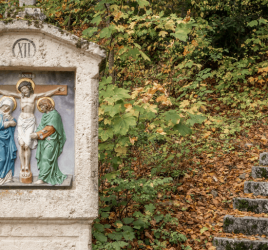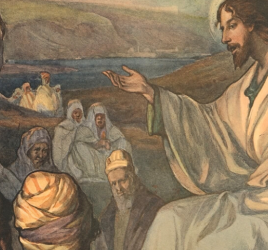
What is the Price of Friendship?
Recently, I’ve been reflecting on various texts about friendship and pondering how it might be one of the most beautiful gifts God has bestowed upon us since creation. As we often find ourselves surrounded by the same people in our daily life, it can be easy to forget how important they are to us until, one day, they are no longer there. It is very human to forget but, at the same time, there are relationships we should not lose track of, should not neglect, and should not disregard when considering our destiny, precisely because friendship is a destiny in itself.
In the midst of the secularized world, the bonds we form with others forever leave a mark on our lives. Friends are those who support you, lift you up, and are there with you to navigate the joys and sorrows of life. What would our lives look like, however, if we were to exist without our friendships? Who would welcome us in the good times and in the bad? This is a difficult alternate reality to imagine and, thankfully, it is not a reality we have to endure. When learning from the writings of St. Josemaria Escriva, our great saint draws for us the image of a Christian friendship– a friendship reflective of Christ’s relationship with each of us. I believe that St. Josemaria’s greatest friend would have been Jesus Christ. I am also sure that alongside Jesus, in the journey of proclaiming the sanctification of ordinary life, were the many friends of Escriva, who then all together became the great family of Opus Dei.
How did our saint of the ordinary view Christian friendship? He emphasized the profound value of sacrifice, of offering something meaningful for another. In his words, “When you find it difficult to do a favor or a service for someone, remember that he or she is a child of God, and that the Lord has asked us to love one another. —And I’d say more: go deeper into that evangelical precept every day; do not remain on the surface. Draw the right conclusions from it — it is quite easy to do so. Then adapt your behavior, on every occasion, to those requirements” (Furrow, no. 727). I believe that St. Josemaria is urging us to seek the deeper meaning of friendship; to understand what being a true friend to those around us actually requires and the sacrifices it may entail. Reflecting on Jesus, we see that the price of our friendship was immeasurably high when he made the ultimate sacrifice for us on the Cross– illustrating the boundless depths of genuine friendship.
I found that it was clear to St. Josemaria that, in order for a friendship to be true and authentic, it must be rooted in charity. Charity is the foundation of a beautiful and great friendship. In Furrow, St. Josemaria points out that friendship can also be a source of charity that helps Catholics, Christians, and others to collaborate for the greater good: “Through your friendship and doctrine—or rather, through charity and the message of Christ—you will move many non-Catholics to help in earnest and to do good to all men” (no. 753). Just simply knowing that friendship should be rooted in charity or that it can be a great source of charity is not enough– it must be exercised. Practicing charity with our friends can look like patience and acceptance: the ability to understand others’ limits and taking the time to consider how our friends’ faults and struggles may not be the same as our own. This is not a matter of tolerating, but rather a matter of continuously nurturing your friendships through
consideration, acceptance, and welcoming the other even in their shortcomings. Sometimes we may even begin to think that we cannot make ourselves understood by those who love us or surround us. In response, our saint challenges us, “You complain that he shows you no understanding. I am certain he does as much as he can to try to understand you. But what about you? When will you make a bit of an effort to understand him?” (Furrow, no. 759). In other words, to be understood by others, we must also try to understand them.
St. Josemaria considered that, “You cannot just be passive. You have to become a real friend of your friends — by helping them. First, with the example of your behavior and then with your advice and with the influence that a close friendship provides” (Furrow, no. 731). Gathering from these words, our saint explains how friendship is not just declared, and today we might say even photographed, but demonstrated through acts of love for our neighbor. In this current age of social media, it is all too easy to present an idealized version of life with each filtered post and finely crafted caption. We can imitate these, at times deceiving, habits we have learned from social media norms and incorporate those into our face-to-face relationships: all show and no depth. Instead, we should live out our friendships ‘IRL,’ led by thoughtful actions and genuine care and not through self-serving motives. Have you ever experienced that feeling when you go out with good friends and truly and fully live in those moments that you might even forget to pull out your phone to snap a photo? These genuinely candid moments can only remain immortalized in our hearts because the most beautiful friendships are lived from the depths of the heart.
Now, what do we do with the people who we do not like, those who annoy us, and those with whom we are perhaps not on the same wavelength? Is it okay not to be friends with such people? Even in this situation, which can often feel difficult to navigate, St. Josemaria suggested: “Meditate on this carefully and act accordingly: people who think you are unpleasant will stop thinking that when they realize that you really love them. It is up to you” (Furrow, no. 734). Here, we are reassured that we do not have to become best friends with someone and we do not have to be liked by those with whom our logic does not agree. All we need to do is make a simple gesture: show these people that you love them for real– as your neighbors, as fellow children of God– and they will begin to understand the meaning of your bond: mutual respect and a recognition of each other’s dignity. St. Josemaria always considered that: “Friendship also means making a heartfelt effort to understand the convictions of our friends, even though we may never come to share them or accept them” (Furrow, no. 746).
As we return to the initial question posed in this article—What is the price of friendship? Depending on who you are, the answer may vary. For some, the sacrifices I have discussed may seem daunting, but for most, I believe they are minimal compared to the profound rewards that a true friendship offers. When our actions are motivated by love and carried out with love, the cost of friendship becomes insignificant, leaving us with nothing to question, not even the price of that bond.




